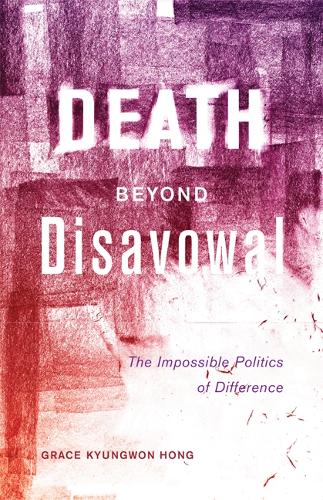
Death beyond Disavowal: The Impossible Politics of Difference
(Paperback)
Publishing Details
Death beyond Disavowal: The Impossible Politics of Difference
By (Author) Grace Kyungwon Hong
University of Minnesota Press
University of Minnesota Press
9th December 2015
United States
Classifications
General
Non Fiction
Gender studies, gender groups
LGBTQIA+ Studies / topics
Ethnic groups and multicultural studies
305.48
Physical Properties
Paperback
200
Width 140mm, Height 216mm, Spine 25mm
Description
"Death beyond Disavowal "utilizes "difference" as theorized by women of color feminists to analyze works of cultural production by people of color as expressing a powerful antidote to the erasures of contemporary neoliberalism.According to Grace Kyungwon Hong, neoliberalism is first and foremost a structure of disavowal enacted as a reaction to the successes of the movements for decolonization, desegregation, and liberation of the post-World War II era. It emphasizes the selective and uneven affirmation and incorporation of subjects and ideas that were formerly categorically marginalized, particularly through invitation into reproductive respectability. It does so in order to suggest that racial, gendered, and sexualized violence and inequity are conditions of the past, rather than the foundations of contemporary neoliberalism's exacerbation of premature death. Neoliberal ideologies hold out the promise of protection from premature death in exchange for complicity with this pretense.In Audre Lorde's "Sister Outsider," CherrIe Moraga's "The Last Generation" and "Waiting in the Wings," Oscar Zeta Acosta's "The Revolt of the Cockroach People," Ana Castillo's "So Far from God," Gayl Jones's "Corregidora," Isaac Julien's "Looking for Langston," Inge Blackman's "B. D. Women," Rodney Evans's "Brother to Brother," and the work of the late Barbara Christian, "Death beyond Disavowal" finds the memories of death and precarity that neoliberal ideologies attempt to erase.Hong posits cultural production as a compelling rejoinder to neoliberalism's violences. She situates women of color feminism, often dismissed as narrow or limited in its effect, as a potent diagnosis of and alternative to such violences. And she argues for the importance of women of color feminism to "any" critical engagement with contemporary neoliberalism.
Reviews
"This book is a significant intervention in scholarship on the politics of life and death, explaining why this dyad is so central to neoliberal forms of governance and building on women of color feminisms analysis of the impossibility of separating out life and death and the danger of forgetting that life for some means death for others."Shelley Streeby, University of California, San Diego
Author Bio
Grace Kyungwon Hong is associate professor of Asian American studies and gender studies at UCLA. She is author of The Ruptures of American Capital (Minnesota, 2006) and coeditor of Strange Affinities: The Gender and Sexual Politics of Comparative Racialization.
